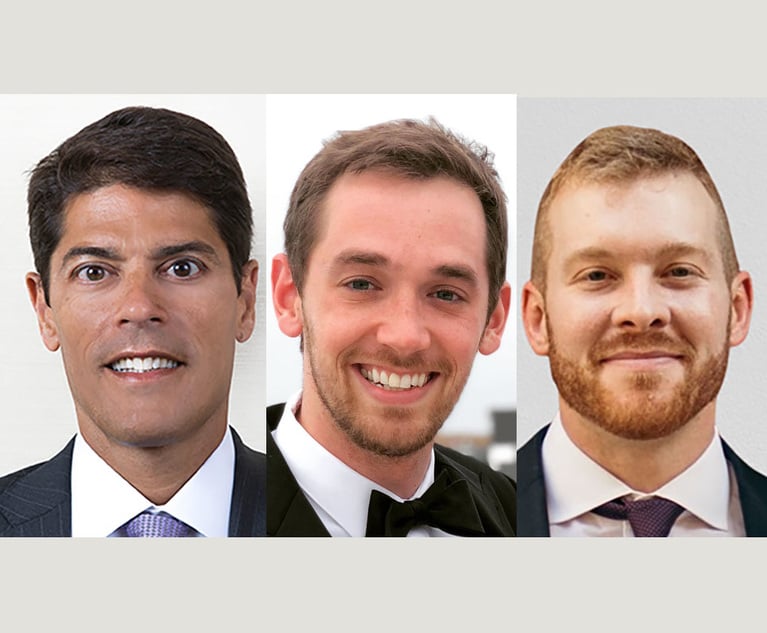Irell's Morgan Chu Breaks Down a $752 Million Verdict Over Cancer Therapy
The IP litigator led a team of Irell & Manella and Jones Day attorneys in an eight-day trial on behalf of Juno Therapeutics and Memorial Sloan-Kettering Cancer Center. The companies had accused Kite Pharma of infringing a patent on ground-breaking CAR T immunotherapy.
December 17, 2019 at 10:26 PM
7 minute read
 Irell & Manella partner Morgan Chu.
Irell & Manella partner Morgan Chu.Juno Therapeutics Inc. and Memorial Sloan-Kettering Cancer Center obtained a $752 million jury verdict for patent infringement last week in Los Angeles federal court against Kite Pharma Inc. Following an eight-day trial, jurors awarded $585 million and a running royalty of 27.6 percent—equal to another $167 million—for infringement of Sloan-Kettering's 7,446,190 patent on genetically engineered T-cells used to fight cancer. The process is known as CAR T therapy.
Irell & Manella and Jones Day persuaded jurors that the patent is valid and that Kite, which was acquired by Gilead Sciences Inc. in 2017, willfully infringed. That means the verdict could be subject to trebling by U.S. District Judge S. James Otero. Juno, which is owned by Bristol-Myers Squibb Co., licenses the patent from Sloan-Kettering.
The plaintiffs' team included Irell partners Morgan Chu and Alan Heinrich, counsel Maclain Wells and associate Elizabeth Tuan, plus Jones Day partner Andrea Weiss Jeffries and associate Sarah Geers, among others. Munger Tolles & Olson and Fish & Richardson represented Kite.
We spoke about the trial earlier this week with Chu, who was also coming off a win in his first Supreme Court appearance.
Scott Graham: Congratulations on your Supreme Court win. You must have been excited.
Morgan Chu: Yeah. Early Wednesday morning, I'm getting prepared for closing argument and a couple of people on our team came by and said, "Oh Morgan, did you hear?" And I said, "Hear what?" And they said, "You just won your case in the Supreme Court." And then I ran off to court to give my closing argument.
Q. Can you explain in lay terms what the technology is about and how Kite was infringing it?
A. So this was the first living drug ever, certainly the first living drug to treat cancer. Cancer cells have this ability to trick our immune system into thinking they're friendly cells as opposed to foreign invaders. So our immune system doesn't go and attack cancer cells.
So what Dr. [Michel] Sadelain and his colleagues at Sloan-Kettering did was, they came up with a way to re-engineer a patient's own T cells. They take the T cells out of the patient's blood stream in much the same way someone gives blood. They put the rest of the blood back into the patient's body. They make some changes to the genetic makeup of those T cells.
That patient has a particular kind of cancer that has a particular kind of DNA sequence, and all of the T cells are now retrained, as if they're special forces, to go and attack that patient's cancer.
While they're killing the cancer cells, of course many of the T cells themselves are dying. But here's the most amazing part of it, and why it's a living drug: The [re-engineered] T cells send signals to the rest of the patient's immune system that say, "We want reinforcements."
And then the patient's immune system begins to make brand new T cells that don't exist in nature, that the patient never made by themselves previously. And they're the exact same as the re-engineered T cells. And then the body makes millions and millions of these special forces T cells. And they look for and immediately kill the cancer.
Q. How effective is the treatment?
A: So [in] early clinical trials, every one of the patients is about to die. The physicians and scientists know that because these are patients with a particular cancer, and every other known treatment has failed them. And on average they'll all pass away in 12 weeks. If it was a loved one of yours or mine and there was one chance in 20, you'd say let's go for it, and it would be a miracle.
And today, both what Juno is doing and what Kite has done with Sloan-Kettering's patented technology is that about 50% appear to have complete remission. In other words, so far as the scientists can detect, the cancer's been killed. And it's all been done with one treatment. [It's not a] recurring treatment that needs to be administered every day, several times a day, every week or whatever it is. This living drug works by one treatment to a patient.
Q. This was a case where your opponent had taken a swing at the Patent Trial and Appeal Board and lost. Was that one of the keys in this litigation?
A. You're right. They petitioned to invalidate the patent and all of the challenged claims were affirmed by the patent trial and appeal board. So they couldn't raise any of the issues on patent invalidity based on prior art before the jury.
Q. During the course of the lawsuit, Juno was acquired by Celgene, and then Celgene in turn was acquired by Bristol-Myers Squibb, and Kite was acquired by Gilead Sciences. Did all of those ownership changes come into play at all in the litigation?
A. Certainly, Gilead's acquisition of Kite came in. And there was evidence on how Gilead valued the one Kite product that was at issue [in the trial], called Yescarta. In their SEC filing, Gilead valued Yescarta at $6.2 billion.
The fact that Celgene acquired Juno came in. Before Celgene acquired Juno, they entered into a deal where Celgene would get rights to certain of Juno's CAR T technologies, but only for sales outside the United States. As a part of that deal, the cash up-front payment that Celgene paid to Juno was $1 billion. That's a real-world license, same basic area of technology, relating to CAR T, but only for sales outside the United States.
What was not supposed to come in was any reference to Bristol-Myers Squibb acquiring Celgene. But the other side had one of their witnesses blurt it out.
Q. Why was that not supposed to be mentioned?
A. Not relevant. How does it help anyone decide whether any of the three defenses are good or bad, or willful infringement, or the amount of damages? I think the only reason why the other side would want it in was to say, "Oh, there's really a big company on the other side called Bristol-Myers Squibb."
Q. What was your evidence of willfulness?
A. We said they knew about the patent, they weren't able to get a license to the patent. They since tried to design around the patent. Their design-around efforts failed. And then knowing about the patent, knowing about the exact sequence, they went ahead and continued to do research and development using the patented technology and then introducing it in their product. We then showed they have another 11 projects to treat different kinds of cancers, that are all based on exactly the same technology, including the exact same sequence. So we thought we had a pretty good case of willful infringement.
They tried to say their CEO and founder wasn't really trying to get a license from Sloan-Kettering. Their excuse was he wanted to talk with Sloan-Kettering about maybe having Sloan-Kettering participate in clinical trials. But he was trying to talk to people in [Sloan-Kettering's] technology transfer office.
Q. Will you be moving for enhanced damages?
A. There's a whole series of different motions we might make, and we haven't made any decisions on that or any other other motions.
Q. Gilead has a good track record of wriggling out of big judgments in post-trial motions—your firm helped them do it in the Idenix case. Are you expecting more big battles to come?
A. I don't know the overall record of Gilead or for that matter any other company, but I'm familiar with that one data point. As far as what to expect ahead, I always assume the other side is going to make every post-trial motion they can make before the trial court, and make every argument that that they think can be persuasive on appeal. So whether it's Gilead or someone else, I assume that's what they'll do.
This content has been archived. It is available through our partners, LexisNexis® and Bloomberg Law.
To view this content, please continue to their sites.
Not a Lexis Subscriber?
Subscribe Now
Not a Bloomberg Law Subscriber?
Subscribe Now
NOT FOR REPRINT
© 2025 ALM Global, LLC, All Rights Reserved. Request academic re-use from www.copyright.com. All other uses, submit a request to [email protected]. For more information visit Asset & Logo Licensing.
You Might Like
View All
Litigators of the Week: A Trade Secret Win at the ITC for Viking Over Promising Potential Liver Drug

Litigation Leaders: Mark Jones of Nelson Mullins on Helping Clients Assemble ‘Dream Teams’

Litigators of the Week: Ingersoll Rand Enforces a Noncompete Against an Exec Who Jumped Ship to Verboten Competitor

Litigator of the Week: After Years Repping Prenatal Testing Client, First-Time First Chair Lands a $57M Patent Damages Verdict
Law Firms Mentioned
Trending Stories
- 1Goodwin Procter Relocates to Renewable-Powered Office in San Francisco’s Financial District
- 2'Didn't Notice Patient Wasn't Breathing': $13.7M Verdict Against Anesthesiologists
- 3'Astronomical' Interest Rates: $1B Settlement to Resolve Allegations of 'Predatory' Lending Cancels $534M in Small-Business Debts
- 4Senator Plans to Reintroduce Bill to Split 9th Circuit
- 5Law Firms Converge to Defend HIPAA Regulation
Who Got The Work
J. Brugh Lower of Gibbons has entered an appearance for industrial equipment supplier Devco Corporation in a pending trademark infringement lawsuit. The suit, accusing the defendant of selling knock-off Graco products, was filed Dec. 18 in New Jersey District Court by Rivkin Radler on behalf of Graco Inc. and Graco Minnesota. The case, assigned to U.S. District Judge Zahid N. Quraishi, is 3:24-cv-11294, Graco Inc. et al v. Devco Corporation.
Who Got The Work
Rebecca Maller-Stein and Kent A. Yalowitz of Arnold & Porter Kaye Scholer have entered their appearances for Hanaco Venture Capital and its executives, Lior Prosor and David Frankel, in a pending securities lawsuit. The action, filed on Dec. 24 in New York Southern District Court by Zell, Aron & Co. on behalf of Goldeneye Advisors, accuses the defendants of negligently and fraudulently managing the plaintiff's $1 million investment. The case, assigned to U.S. District Judge Vernon S. Broderick, is 1:24-cv-09918, Goldeneye Advisors, LLC v. Hanaco Venture Capital, Ltd. et al.
Who Got The Work
Attorneys from A&O Shearman has stepped in as defense counsel for Toronto-Dominion Bank and other defendants in a pending securities class action. The suit, filed Dec. 11 in New York Southern District Court by Bleichmar Fonti & Auld, accuses the defendants of concealing the bank's 'pervasive' deficiencies in regards to its compliance with the Bank Secrecy Act and the quality of its anti-money laundering controls. The case, assigned to U.S. District Judge Arun Subramanian, is 1:24-cv-09445, Gonzalez v. The Toronto-Dominion Bank et al.
Who Got The Work
Crown Castle International, a Pennsylvania company providing shared communications infrastructure, has turned to Luke D. Wolf of Gordon Rees Scully Mansukhani to fend off a pending breach-of-contract lawsuit. The court action, filed Nov. 25 in Michigan Eastern District Court by Hooper Hathaway PC on behalf of The Town Residences LLC, accuses Crown Castle of failing to transfer approximately $30,000 in utility payments from T-Mobile in breach of a roof-top lease and assignment agreement. The case, assigned to U.S. District Judge Susan K. Declercq, is 2:24-cv-13131, The Town Residences LLC v. T-Mobile US, Inc. et al.
Who Got The Work
Wilfred P. Coronato and Daniel M. Schwartz of McCarter & English have stepped in as defense counsel to Electrolux Home Products Inc. in a pending product liability lawsuit. The court action, filed Nov. 26 in New York Eastern District Court by Poulos Lopiccolo PC and Nagel Rice LLP on behalf of David Stern, alleges that the defendant's refrigerators’ drawers and shelving repeatedly break and fall apart within months after purchase. The case, assigned to U.S. District Judge Joan M. Azrack, is 2:24-cv-08204, Stern v. Electrolux Home Products, Inc.
Featured Firms
Law Offices of Gary Martin Hays & Associates, P.C.
(470) 294-1674
Law Offices of Mark E. Salomone
(857) 444-6468
Smith & Hassler
(713) 739-1250






